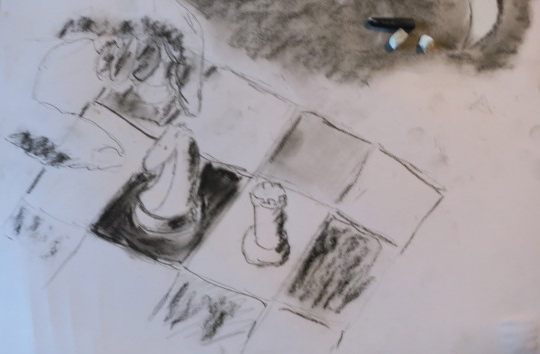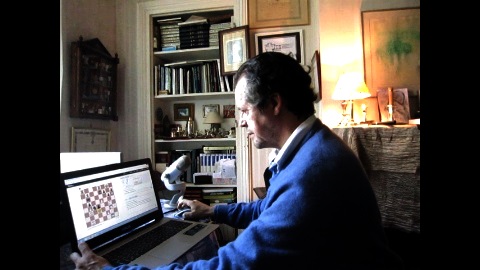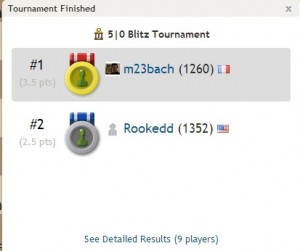
Guest contributor: Thierry Kauffmann
Chess Champ
categories: Cocktail Hour
7 comments
The first time I realized what I had lost to Parkinson, and how much I had lost, was on Yahoo. I was watching a chess game on the internet. These are games played against humans. In live chess, slow games last ten minutes. Fast games range from two down to one minute. That’s for the whole game, not for one move. What they call bullet chess. It’s like blitz, in accelerated motion. Two players, ranked 2000 and over, and me, watching. Stupefied by the speed, I could not comprehend what was happening, except that it was happening without me, beyond the reach of my brain, or mind, and body.
Shortly afterwards an accident of the Internet made it possible for me to play against one such player. I had watched his moves onscreen and commented. He offered to let me play against him. At that speed (two minute game, because I asked). I could sense, I could feel, very distinctly, feel his mind at work. As if he were teaching me how to think, faster than I ever could think by myself.
It was an intense experience that left me exhausted, and wanting more. I had to prove myself before I could earn a chance to play against a player of his rank.
In the meantime, I started singing. Again. But singing Bach, not the choral parts, but the piano parts. Singing at the speed of Sviatoslav Richter in his interpretation of the “Well Tempered Clavier,” the WTC. I found that this running with a music giant sped up my mind and opened it as the chess had. I also found that I walked better after this exercise.
But in both cases, I felt a wall. Chasing a giant, I was always behind. How to rise and take the lead and then fall into who I am, after this effervescence of being, this ebullient interplay with another mind, kept eluding me.
One night, I was up at 3 AM, typical time for a Parkinson patient. I sleep in my parents’ kitchen (in Grenoble, France), a large room decorated with antique copper pans hanging against the wall, gas lamps inherited from my grandparents, an eighteenth century buffet, a large French window opening on a quiet backyard away from the noisy street. And I need all the quiet I can get, just to be able to sleep. I did my routine. Get pill, watch for trembling, do not fall, drink, do not believe what the brain says until after the pill, do not panic, breathe. Play chess.
It was a tournament, five minute games, adrenaline included. I cannot win if I let my emotions take control. Nor can I win if my hand is not firm and fast, in other words, if I have Parkinson. Obvious. Now reverse the proposition. I cannot have Parkinson if I win. Now that, that is far more interesting. That is why I play. All I need to do is win.
It was 4:40 in the morning when the tournament took place. I was logged on the chess server. Ten seconds before the beginning of my first game, a screen opened with my opponent’s name and ranking, facing mine. He was ranked higher than me. He opened with d4, I responded with d5. The Queen-Pawn game. I manage to play faster; in fact, he lost on time. Twenty seconds later, new screen, new opponent. I played like I had never played before. Calm, tranquil, fast, collected. I had no idea how long it would last, how many rounds. A screen popped, I hit the mouse. Until no more screen. Instead a picture, with three medals. The first one had my name in it. I had won!
There was bliss in the house of love, there were shouts of joy and plenty of merriment in the animated kingdom. That evening my parents and I opened a bottle of wine in the kitchen and gathered around the table. Through the window the mountain of the Chartreuse rose against the dark blue sky. We laughed and we told stories. It was a celestial pause in the inexorable march of the firmament. In its vespers, the earth smiled back.
[I’m a writer, pianist, and composer with Parkinson. My first essay was published right here on Bill and Dave’s Cocktail Hour. It was soon followed by two more essays. Several stories have appeared on Nibmagazine. I lived in the Midwest for 17 years and now reside back home in France.]




Quite an accomplishment! I expected the satisfaction of improvement from this sweat, not victory. You are a champion in my book, Thierry, where honor and accomplishment stand side by side.
essay, not sweat! (My phone’s still trying to out-smart me!)
No sweat Tommy! Thank you for your comment. I’m honored.
Well Hello, Frenchie!
Just love this essay, the antique copper pans and the French window in the quiet backyard…that 4AM tournament put knots in my stomach–loved the entire scene…everything so personal and vital hinging…the winning ride…the party. Also the Parkinson’s “take away” that is the crux of all really gets to me. I just hate being robbed of anything–especially physicality– it makes me so angry, I relate on that.
A confession. I have a written list of favorite Thierry lines. I added this, “Do not believe what the brain says until after the pill.” Now that is just plain sexy-good-writing.
Hi Debora,
Thank you for your warm words. I’m happy to hear that you felt what I was trying to express. Parkinson is such a foreign world, that I’m amazed it can be communicated to a person from “the other side.”
Thank you again for your support.
Thierry
The mind is such a wonder and mystery. It is so great that you have found your own medicine to cope with one of it’s frailties. My wife has early onset Alzheimer’s. I commend you for the openness and sharing of your story.
D.L. Wood
Thank you D.L. Wood. All my thoughts to your wife. There is no greater challenge than finding one’s way back to life. I hope my piece can help her. This is why I write.